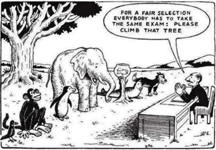    |
||
 |
The Future of U.S. Higher Education |
Purchase Tickets Season Tickets for this event are available at 503-819-8365 or online here! |
|
||
David Snyder has been Contributing Editor of The Futurist magazine for over a quarter century. In addition, he has authored hundreds of studies, articles and reports on the specific future of a wide range of U.S. institutions, industries and professions, and on the socio-economic impacts of new technologies. He is the editor/co-author of five books, including Future Forces and a sequel, America in the 1990s, both published by the American Society of Association Executives.
|
For decades, corporate leaders, politicians and many educators have asserted that, However, Labor Department forecasts consistently show that – for the foreseeable future – more than half of all U.s. jobs will continue to require no more than a high school education! At the same time, job content analysis has shown that, from now on, ALL work will require a new set of "higher order cognitive skills," including: systems thinking • problem analysis These new skills – the Common Core Standards of learning for reading, math, Against this backdrop, Snyder describes how economically-stretched educators in both K-12 schools and post-secondary institutions are quickly adopting Internet-based technologies – including etextbooks, social networking, computer simulations, on-line games, Skype, “MOOCs,” modular curricula & certification, and artificial intelligence – to provide their students with both the traditional skills and the new competencies that they will need to meet the challenges of our rapidly evolving future. Even more quickly, Snyder says, edupreneurs like Khan Academy, Coursera and edX are exploiting cyber technology to meet the exploding demand for career-enhancing, future-fulfilling knowledge. By 2020, our understanding of the content and form of education will have evolved substantially from today, and the successful institutions of learning will be those who have discovered how to meet society's changing needs and expectations.
|
|